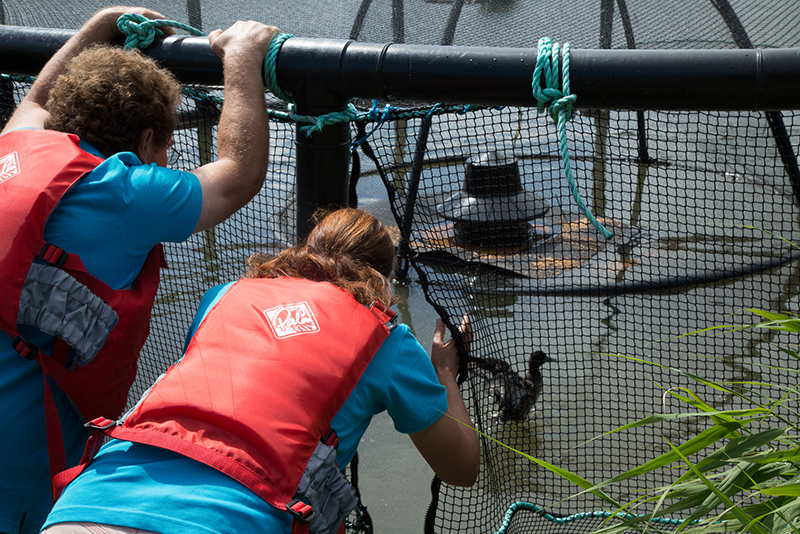World’s first floating aviary to save rarest duck

With just 80 individuals in the wild, Madagascar Pochard is the world’s rarest duck and the race is on to save it from extinction. The species is to be the subject of a unique conservation project, the Wildfowl and Wetlands Trust (WWT) has announced.
Conservationists at the organisation have created a floating aviary, thought to be the first of its kind. The aviary will protect released birds as they acclimatise to their new surroundings on Lake Sofia in northern Madagascar. The birds are part of a captive-breeding programme in which chicks have been raised at Slimbridge WWT, Gloucestershire. These are set to be released into the wild in 2018.
Madagascar Pochards spend almost all their time on water, even feeding underwater, so WWT researchers came up with the original idea of adapting salmon-farming cages as pre-release aviaries. To ensure the method is safe for the birds, it is first being trialled on Tufted Ducks at Slimbridge.
The ducks will be housed in the floating aviaries for five to 10 days while they adjust to their new surroundings. Once they are comfortable, conservationists will open a door in the aviary to allow them to come and go as they please. The Tufted Ducks in the British trial will be closely monitored by scientists, who will use radio tags to ensure that the birds adapt successfully to life in the wild.
WWT Programme Development Advisor Peter Cranswick commented: “I’m excited that visitors to Slimbridge will see a novel conservation technique being developed. This is the ‘coal face’ of our work in Madagascar on show in Gloucestershire and could have far reaching consequences for one of the world’s rarest creatures. WWT has a long history of pioneering conservation and we’re hopeful that the floating aviary will be added to that list.”

WWT scientists release the Tufted Ducks into the aviary at the start of the trial. Photo by Sam Stafford (www.wwt.org.uk).
The release of the pochards next year with project partners, including the Durrell Wildlife Conservation Trust, is just one step in WWT’s long-term plan to restore Madagascar’s wetlands. The charity has worked closely with communities around Lake Sofia for the last few years to improve farming and fishing so that they are more productive while having less impact on the natural environment. It has also provided guidelines for the government, authorities and conservation organisations in Madagascar to help them improve wetland conservation in the country.
Peter Cranswick added: “Madagascar’s wetlands are not in a healthy state. We’ve identified one – Lake Sofia – where the damage is less severe and that’s where we plan to release the pochard. But if they leave that lake, their chances of survival are very low, such is the condition of other wetlands in the country. It’s vital that the birds are completely happy in their surroundings before we let them go – the floating aviaries are a crucial part of that.”





